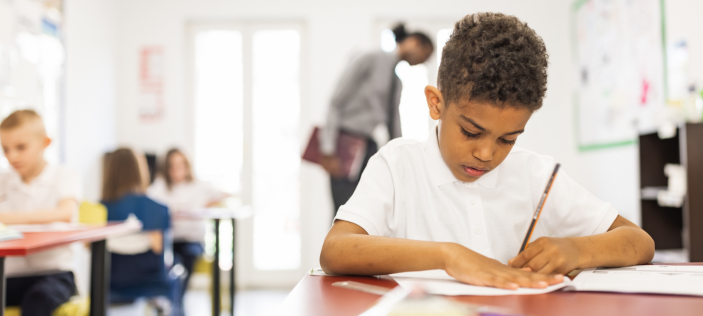
“What a great conference to rejuvenate the passion and inspiration for writing and the teaching of writing - thank you!” – R. Woode (Woodlands)
“Just loved the speakers!”- M. Childs (Sheredes Primary)
“I'm pleased the conference did not focus on 'what children need, to be at expected standard by the end of Year 6' but more on creating writers as a lifelong skill.”
R.Colman (Bowsland Green Primary School)
“Thank you so much for a really inspirational day. It's good to end with so much to reflect upon and share back at school.”
N. Branagan (Aston St. Mary's CE (VA) School)
The National Primary English Conference 2024: My Voice, My Writing was a highly anticipated event on the HFL English team’s calendar and perhaps on yours too! Inspiring and motivating keynote speakers included children’s literary icon Micheal Rosen and award-winning children’s author Katya Balen. We were also honoured to hear from experts in their fields Professor Debra Myhill and Professor Neil Mercer, not to mention the pedagogical and practice knowledge we gained from head teacher Sonia Thompson, English lead Sam Creighton, HFL English advisers Kirsten Snook and Amanda Webb, English consultant Nicola Izibili and lecturer Navan Govender. The day was jam-packed with golden nuggets to reinvigorate, reignite, and empower teachers with the tools needed to teach the next generation of writers.
It was fitting that Michael Rosen began our conference referencing the ‘secret strings’ that lie waiting within literature, as many common threads and themes were interwoven between the sessions throughout the day. Threads that returned repeatedly included that of children building a repertoire of reading to support their writing, having autonomy over their writing, manipulating grammar for effect on their reader, the benefit of having a community of writers, and embracing each stage of the writing process itself. Ultimately, educators, writers and academics were united in delivering their message: we want to enable children as writers, with agency, who are capable of learning and applying the craft of writing for authentic audiences.
“Be wild!” (Katya Balen)
Another key theme of the conference was the idea, and indeed pedagogy, of writing for pleasure which made me wonder how many schools incorporated this element in their own writing curriculums. Writing for pleasure can be defined as writing undertaken for enjoyment and satisfaction (as further articulated by Ross Young in his Writing for Pleasure Manifesto, 2021). English consultant, Nicola Izibili, championed the concept of ‘writing club’ where children are given opportunities to write freely about topics that interest them. She also explained that she herself was part of a ‘community of writers’ both inside and outside of the classroom and showed an insight into her own writing journal which she regularly shares with her children. Writer, Katya Balen, took this idea a step further by promoting the concept of ‘free writing’ in which children are given time to ‘just write’ and ‘be a writer’. Katya was passionate about giving children freedom and autonomy when writing to escape the constraints that can sometimes occur in school due to a busy timetable or other curriculum requirements, that could, in turn, reduce writing satisfaction.
“Success is messy. Getting a strong writing curriculum can be messy.” (Sonia Thompson)
Katya Balen described the writing process as a messy one, comparing it to sorting out your ‘junk drawer’ when you take everything out and pull it apart in order to improve and rebuild it again. Head teacher, Sonia Thompson, acknowledged that crafting a writing curriculum that works for your pupils can also be a messy process. She gave some excellent practical advice on how the writing process can be shaped in schools based around the process of drafting, revising and editing (starting from year one and making use of editing flaps), building a culture where feedback leads to improvement and having opportunities for writing to be discussed. Sonia illustrated that these key concepts of the writing process can be followed whilst still ensuring a commitment to the statutory obligations of the national curriculum, which was refreshing. More information on strategies to support the writing process can be found in The Education Endowment’s report: Improving Literacy in Key Stage 2.
She also highlighted the importance of teaching grammar as part of the writing craft (more on grammar for effect to come) and shared the innovative idea of ‘impact flaps’ for children to make comments about their grammar and language choices and their intended impact on their reader. Sonia explained that the school has ensured that its writing curriculum has a key focus on audience - including differing levels of formality - as well as having an authentic purpose. This was a common thread throughout the day, echoed also by Nicola Izibili. Sonia’s school publish their writing in many formats (including competition entries). Michael Rosen also advocated opportunities for children to publish and circulate their writing in order to give a clear purpose and authentic audience. (Although, it should be noted that Michael Rosen did make the valuable point that some writing may be personal to children and therefore not appropriate to share.)
“…embedded within a beautiful sequence of learning.” Amanda Webb
Our very own advisers, Amanda Webb and Kirsten Snook, offered further practical advice leading workshops on ensuring the fundamentals of writing are in place; they suggested practical ways to support children in the writing process. Kirsten reminded us that sometimes the resources that we need may be lurking somewhere in the depths of our classrooms. She discussed comprehensively how to support children to segment words for spelling so that they can move forward in their writing. She demonstrated how to use the perhaps forgotten resource - the phoneme frame - in a more kinaesthetic manner by using counters! Amanda continued the threads of the conference by using texts for inspiration to ensure learners understood the important skill of sentence demarcation, taking strategies from our popular Fixing Full Stops Across KS2 and Securing Full Stops at KS1 training.
She explained the ‘Alien Sentences’ activity in which children need to identify the ‘alien’ (non-sentences) and ‘real’ sentences using examples from their focus text. The teacher then acts as a guide in the discussion around the decision to be made, supporting children to ‘fix’ sentences. For further tips, do take a look at this HFL blog: Don't Forget your Full Stops. This linked clearly to a point made by Debra Myhill about teachers being able to express language effects through classroom talk: rich discussions about the impact of our writerly choices support children to be mindful of their own choices in their writing.
“Opening doors to writing… in a writer friendly way.” (Michael Rosen)
Michael Rosen shared some great ideas of how to open doors into writing, using texts as a motor for writing. He began by building on the ‘Tell Me…’ book talk approach by Aidan Chambers by encouraging the use of open questions (such as ‘did you hear anything in the story that has happened to you or someone you know?’ and ‘if you could ask a question to anybody in the text what would it be?) which help children to delve into texts as a reader. He also spoke about an activity he named ‘secret strings’ (as mentioned at the start of this blog) in which children investigate and explore texts as a writer; identifying cohesive elements of writing craft which could then be applied in some way to their own writing. Debra Myhill also advocated children exploring the writing craft within texts through learning about how grammatical choices have been made to shape meaning for the reader. Like Katya Balen, she highlighted the importance of treating children as authors themselves, so that they can harness the great power of language choices, that established writers also make. Explicit teaching of the ‘why’ behind grammar choices allows children to make informed choices when crafting their own writing. This can be further examined through the LEAD principles.
“Mining reading for writing ideas…” (Sam Creighton)
Michael Rosen elaborated further on the writing process by talking us through practical steps that can be taken to provide children with a springboard to writing. He reminded us of some firm favourite drama techniques such as freeze frames and hot seating, which can help children to break the story open, and begin to build an ‘intertextual repertoire’ to use to inspire their own writing. He also encouraged techniques such as creating a prequel or sequel to a text, taking a character from one story into another. He talked about ‘changing the dial’ on a story, to rewrite it by altering the setting, time frame, characters, or plot line. These simple and practical ideas are playful and workable in the classroom. Sam Creighton also spoke about ways in which he improved writing at his school, including ‘mining reading for writing ideas’ to encourage children to be inspired by what they read when creating their own writing, without making a carbon copy of the original text. Micheal Rosen described using the ‘like that’ principle (particularly with poetry) where children are encouraged to write their own piece of writing using a key feeling, structure or sounds from another text. A touching moment in this keynote, was when Michael shared aloud his poem about discovering he had a brother who passed away. Michael explained that this was written about looking through some old family photographs, and went on to explain that children could use the ‘like that’ principle, based on this poem, by exploring their own family photographs for stimulus.
“…big issues are discussed in a safe way to help children with resilience.” (Kayta Balen)
Katya Balen suggested that books can help children deal with adversity, build resilience and discuss big themes. She herself writes about some big themes, such as domestic violence, anger and loss, and talked about giving children the space to do the same. Similarly, Navan Govender spoke about children writing about their sometimes adverse, yet rich, experiences within a community of writers (also mentioned by Nicola Izibili) and being socially responsible within their pieces. He showed us an example of a hard-hitting poem based on Little Red Riding Hood going to deliver drugs through ‘the hood’ in South Africa. It demonstrated an 11-year-old writer portraying identity and culture while exploring social issues of the time (including violence and HIV).
Allowing children to write about issues that really matter to them not only helps motivate children as writers, but also gives teachers the opportunity to explore ‘big issues’ further – issues which may be having an impact on their children’s lives. Equally, when children do write about these ‘big issues’, it may also be an indication of them making sense of what is going on in the world around them. Giving children the time to write with agency, therefore, can open up a safe avenue for conversation and discussion about topics which may have otherwise been buried. This is an important message to consider as teachers when responding to children’s writing. Are we responding first as humans?
“Reading and writing float on a sea of talk” (James Britton)
Neil Mercer inspired us all to think deeply about the moral imperative for teaching oracy effectively. He explained that the Education Endowment Foundation found that oracy has a high impact on pupil outcomes and other research has also indicated that language development, cognitive development and educational progress are all closely related. Considering these high stakes, it seems vital that oracy is a key feature across our curriculum. Neil also provided us with practical strategies on how to implement oracy strategies in the classroom. For example, he suggested a very innovative yet efficient way of teaching children new vocabulary through songs or chants. He also highlighted the importance of not just learning through talk (dialogic approach) but learning how to talk.
This is particularly pertinent when teaching children how to partake in discussions. Neil suggested that this could be achieved through giving children agency to create the ‘ground rules’ for discussions to work. (You will notice that common thread of agency appearing once again!) Due to group-based activities greatly benefiting learning, Neil suggested that it was vital that these discussion skills are taught from an early age through well-planned, purposeful oracy instruction and modelling. Neil was hopeful that the tides may change in terms of the prominence of oracy in the national curriculum to ensure that children have the critical skills needed for future success.
What an inspiring day! We’d love to hear about how the messages of the day are shaping practice in your schools and settings.
Don’t forget, if you attended the conference last week you are still able to access recordings of all of the sessions as well as some slides which have now been added. To access these, please visit the link you were sent to attend.
If you are looking for further inspiration for your own writing curriculum, you may be interested in HFL’s Essential Writing which is due to be released in September 2024. It is a complete scheme for Years 1-6 which encapsulates the key threads of the conference. Do join us for our free information webinar on 12th March 2024.
HFL English team’s reflections
We hope you were as inspired as we were by the speakers on the day. Below are some of our team’s reflections.
Developing Children’s Writing for Purpose and Pleasure
Michael Rosen - Poet, performer, broadcaster and scriptwriter
“So much to take away…employing the idea of intertextuality in the classroom, using ‘secret strings’, prequels, sequels and mash up stories, the ‘like that’ principle, allowing children to write about their own lives, the importance of authentic audience and for children to be able to publish their own writing.”
Story Mudlarking
Katya Balen - children’s author
“In addition to one of the most engaging and inspiring author talks I have ever listened to, she had these top tips for inspiring the children you teach to reach for more:
- Never say that books a child chooses to read are ‘bad’ (even if you think they are rubbish); instead, nudge them towards trying a different choice every so often.
- And, when you speculate about what may happen in a story they are creating – emphasise that there are ‘no wrong answers’ and imaginations will soar.”
Why Oracy Matters
Neil Mercer- Emeritus Professor of Education and Director of Oracy Cambridge
“A fascinating session! It was inspirational to hear Neil talk about the power of talk and its transformative potential for learning. Lots of ideas to take back to the classroom.”
Implementing Authentic Writing Projects in the Classroom
Nicola Izibili- English Consultant and Practising Teacher at The Writing Web
“An inspiring session which reminded us about the importance of an authentic audience and purpose when writing.”
Crafting a Writing Curriculum
Sonia Thompson- Headteacher at St Matthew's C.E. Primary Research and Support School
“A reflective and poignant point from Sonia, linking to the work of the Writing for Pleasure Centre, which stems from children’s writing starting with themselves, using their own names and lived experiences as a stimulus for writing. What better way for children to evolve as writers than to use what and who they know best?”
Writing Realities
Navan Govender- Lecturer in Applied Language & Literacy Studies at University of Strathclyde
“Such a powerful approach and so many ways in to apply this with different age ranges...”
Supporting Struggling Writers
Kirsten Snook- English TLA at HFL Education
“A call to bring back the trusty phoneme frame! Such a versatile and impactful scaffolding resource to support children who are still developing their phonic application within writing.”
Don’t Forget Your Full Stops!
Amanda Webb - English TLA at HFL Education
“Amanda’s session provided excellent practical strategies for addressing that common area for development: sentence demarcation. Video footage captured helpful strategies to support sentence construction with pupils.”
The Reading and Writing Connection
Sam Creighton - Literacy Lead
“This session helped subject leaders to find the starting point for reflections about their own schools.”
Grammar as Choice
Debra Myhill - Professor Emerita of Language and Literacy at University of Exeter
“Grammar is the building block of language - we can’t pretend we don’t need to teach it, but it’s not about naming parts of speech or playing hunt the punctuation mark. Instead, it’s about effective communication, owning our language and manipulating it to have the best effect on our reader or listener.”
Further reading
In collaboration with the Norfolk Children’s Book Centre, we have compiled a list of wider reading written by the speakers. Visit this page to explore a range of children’s books as well as further reading for teachers.
Norfolk Children’s Book Centre: 2024 National Primary English Conference: Books by speakers
Websites
The Writing Web | The Freedom of Words to Inspire
The grammar for writing pedagogy | Writing resources for teachers | University of Exeter
Voice 21
Katya Balen
Blogs
Teaching grammar for purpose rather than for evidence | HFL Education
Texts
‘Tell Me: Children, Reading and Talk’ by Aidan Chambers
The ‘Opening Doors’ series by Box Cox
‘What is Poetry?’ by Michael Rosen
Going Through the Old Photos - The Children’s Poetry Archive



